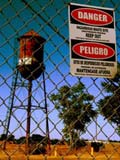
A Volatile Time
Homeland Security regulations tighten requirements for chemical, petroleum products
- By Matt Scherer
- Jun 17, 2008
 If you're a security integrator working with companies that store or produce chemical or petroleum products, your clients have probably asked for assistance with the Department of Homeland Security's Chemical Facilities Anti-Terrorism standard (CFAS).
If you're a security integrator working with companies that store or produce chemical or petroleum products, your clients have probably asked for assistance with the Department of Homeland Security's Chemical Facilities Anti-Terrorism standard (CFAS).
Enacted in 2007, the regulation tightened security program requirements for any industry that stores volatile substances. As security industry analysts have noted in published media and government reports, security programs for some manufacturers, as well as storage facilities for chemical-based products, have been somewhat casual.
"While the government has focused its attention on regulating security within the chemical industry, other industries can use CFAS guidelines to improve the security effectiveness of their operations," said Jan McKenzie, ASSA ABLOY's director of national accounts.
McKenzie said her organization already helped its manufacturing and logistical industries clients to adopt some of the key points established in the new DHS inspection program.
The CFAS can provide a security professional with some guidance in drafting internal guidelines. Here is a summary of the regulation's major points that protect any logistical or manufacturing distribution center:
A vigilant self-inspection program. CFAS and other federal regulations provide chief security officers (CSOs) with basic guidelines for building self-inspection programs. Once this security checklist is completed, logistical center chief security officers should update and review their company's self-inspection program as often as possible.
"With the threat of terrorist attacks against chemical industries as well as the loss of potential revenue for nonchemical industries, it's important for these security professionals to constantly review their inspection programs," McKenzie said.
"CSOs should consider hiring outside consultants to audit their security programs and report their findings to give an independent assessment." McKenzie said a company's CSO can change security policies based on specific audit findings as well as update a budget to add the infrastructure and human resources needed to address the problem.
"While internal audits work, a security penetration testing team can truly evaluate how a company's loss prevention program is protecting its assets," said Sloan Foster, vice president of marketing for HBMC Inc. "A professional firm can infiltrate a company by simple things such as following a worker through a door and then finding an unoccupied computer to gain access to financial data or sensitive business information."
Quick fixes aren't the solution. When a manufacturing firm's CSO completes an external or internal audit, the CSO should realize that it takes time to address all the issues uncovered in an audit.
"When an audit reveals problems or issues within any business' security program, most CSOs want to fix it right away," McKenzie said. "To really address some security issues, especially if additional funding is needed, it can take time to get the money as well as find the right vendor or installation team to implement the necessary changes."
A consistent installation process. Manufacturers and logistic centers should hire national security installation firms that adhere to and understand a company's standardized security requirements for each facility within an organization.
"We have seen customers who aggressively expand the construction of new facilities start to adapt the same standards for their doors and openings from one region of the United States to another," McKenzie said. "Unlike most security programs right now, national vendor construction programs adopt a common standard in the construction of their facility's signs, flooring, door automation, and IT infrastructure.
"The security industry is just starting to embrace a national standard for their phase of most construction projects."
Working with client Home Depot, ASSA ABLOY helped the Atlanta-based company establish a standardized approach devising the same door and hardware construction schedule for each new facility.
"A consistent design for a logistical center's security programs, especially one with more than one location, makes a lot of sense when you consider the training aspect for new employees and refresher security training for other staffers," McKenzie said.
Making real-time updates. As logistic firms and manufacturers add more equipment to their security infrastructures, CSOs should immediately update their self-inspection programs.
"Whenever a new type of security equipment is added, it's important for a security team to consider how it impacts the system's operation and address it on their checklist," McKenzie said.
Preparing for the worst-case scenario. Even when the best security plans are in place, a logistical center CSO should sit down with staff members to review security breach response processes.
After completing that brainstorming session, a CSO should then update the company's emergency response manuals. To test the response process, a CSO should hold a tabletop or simulated exercise to practice reaction.
"The Navy provides a good example of how security exercises can be applied to a business," said George Turney, a retired chief warrant officer and a business consultant. "By constantly conducting security exercises at sea, if a serious incident should occur, the ship's crew knows their roles and responses to a variety of scenarios.
"Businesses can learn from the military the value of holding these exercises within their facilities," Turney said.
With a blend of a well-thought-out security checklist, updated equipment, and an ongoing evaluation of a logistical center's security processes, the CSO can protect an organization's infrastructure from an external attack.
This article originally was published in the May 2008 issue of Security Products magazine.
About the Author
Matt Scherer is the president of Scherer Communications LLC.